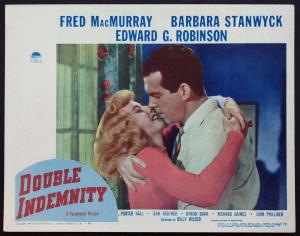
Source: Jenikirbyhistory
At the beginning of Billy Wilder’s Double Indemnity (1944) Walter Neff (Fred MacMurray), a successful insurance salesman turned fraudster, narrates his undoing into a Dictaphone: “I killed him for money—and for a woman. I didn’t get the money. And I didn’t get the woman.” Wilder loved to bookend films with laconic summaries [who could forget Joe E. Brown’s final line in Some Like It Hot (1959): “nobody’s perfect!”]. Double Indemnity is a film noir, based on a James M. Cain novel with a script by Wilder and Raymond Chandler; in other words, it’s got a more hardboiled pedigree than a turn-of-the-century boxer. Noir makes us think of weak men, strong women, fast talking, and hard smoking. It’s that rapid repartee that, much like the Neff’s opening words in Double Indemnity, has always captivated my mind.
A well-crafted line delivered by the right actor can be what slam poetry can only pretend to be—what it must’ve been like to hear ye ole scop regale you and every person you’ve ever met with sagas about far-off lands. Lived poetry in other words, not just read from a page for its own sake, but a vital play of sounds, meanings, rhythms—and all else, making good, old-fashioned use of what is ultimately among our oldest tools: language.
Double Indemnity is full of just such moments. It’s final line (“I love you too”) is justifiably famous. Neff’s finished his dictation and his colleague the insurance adjuster Barton Keyes (Edward G. Robinson) walks in. Keyes and the little man in his stomach have felt something was off for some time. Now he knows what was wrong and why he couldn’t make out all the details: his best source was the fraudster. Neff can’t help but point this out: “Know why you couldn’t figure this one, Keyes? I’ll tell you. ‘Cause the guy you were looking for was too close. Right across the desk from you.” The sad Keyes limply shoots back: “Closer than that, Walter.” Neff drops the last line and Keyes, who’s had his cheap cigars lit by our protagonist all through the investigation, lights the dying cheat’s final cigarette. Those few sardonic words and that one gesture concentrate the whole film. And what happens between the Dictaphone sequences ain’t too bad either.
I couldn’t help but consider that emphasis on language (a major part of what codes films as “noir” for a contemporary audience—though some of the above is just Wilder’s wit) with the “soy dialogue” so heavily associated with contemporary cinema, especially the Marvel Cinematic Universe [MCU (see here for a recent—and refreshing—rant on the subject)]. Think the 80s action hero quipping after he rushes out of the flames. Think of the Duke Nukem being all out of bubble gum. Extend that to every character in every film, a constant ironic undercutting of any moment even pretending to seriousness, and you have an idea what I’m talking about. Joss Whedon is probably its most famous proponent. It often gets called “snappy.”
The thing is that Chandler, Cain, and Hammett wrote “snappy” dialogue too. So, what makes one irritating (have you noticed I find one kinda irritating?) and the other compelling, poetic, Beowulf-ian? A good answer would take a book, but this is a blog and ostensibly this is a film review. The unsatisfying, but satisfactory answer—the one I’ve been able to get out of the old noggin over the last few days of thinking—is humanity. The humor of a “snappy” line in a Wilder movie [or say in a movie like Ernst Lubitsch’s To Be or Not to Be (1944)] is variable, often sardonic, but not without a certain humanity. A mournful humanity perhaps, or a playful one. But the emphasis is on the gamut of human emotions, on the ironies that dominate and animate life. We humans have got language; life involves a hell of a lot of suffering and pain—may as well use what we’ve got to make it bearable.
Whereas with the Whedon-esque dialogue, we’re left with nothing but the gaping abyss. A character survives what seems an unwinnable battle, only to have any sense of the dramatic sucked away by a wry joke, or a gesture at the absurdity of the situation. Ironically, this undercutting makes the chasm at the bottom of the human experience clearer—it removes any sense of tension and leaves the viewer with nothing better to do than contemplate the emptiness of it all.
And that’s weird. Times are tough. You’d expect that Depression-era grit, not the distillation of 90s tomfoolery. But if you roll that carefree attitude up with nostalgia (as is so often done), I guess it’s distracting enough for most. For my part, I’d rather turn on a Wilder flick. And if I want Wilder at his linguistically wittiest, it’s Double Indemnity every time. No question.













